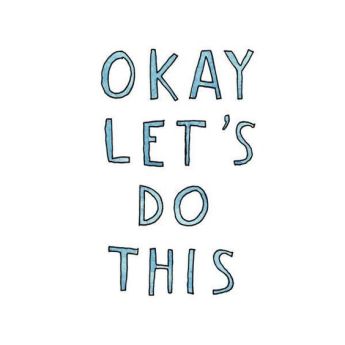If you’ve been following me here or on social media for a while, you may know that in August I started struggling with stress and anxiety. It was particularly the physical symptoms that got to me, they were so bad one day I had to leave work.
That prompted me to go to the doctors who gave me a number to call so I could self-refer myself for cognitive behavioural therapy (CBT). This is pretty standard practice for people struggling with low mood and anxiety, as far as I’m aware it’s the first port of call.
My doctor said if it didn’t help and things didn’t improve, I could go back to discuss medication and/or being signed off from work – two things I wanted to avoid if possible.
I was surprised at how quick the process was, as I know this isn’t the case for everyone. I got a phone call assessment within days and an appointment within about two weeks. I took a longer lunch hour at work on Mondays and went to my sessions then.

I told work what was happening and they were very supportive. Again, I’m lucky that I work for a company that runs mental health websites, so they are acutely aware of the importance of talk therapy.
My CBT therapist was really nice, slightly younger than me I think, but someone I felt very comfortable talking to. She made it clear that CBT is not the same as counselling and that the aim was to help me achieve my goals, which were to reduce physical symptoms of anxiety and learn to cope better with ‘things’ in general.
I was feeling overwhelmed and paralysed. I didn’t know what to do, and this is exactly what CBT is designed to do – help you problem solve, manage stress and move forward.
It doesn’t delve into your past to uncover the ‘whys’ and ‘hows’. It takes your history into consideration but is rooted in the present – how you can improve things here and now. And for this reason, CBT is not for everyone.
Some people need to look into their past. Some people need deeper healing. For me though, I was experiencing a blip, a moment of overwhelm and needed some tools to cope better. Basically I was the perfect candidate for CBT.
Before each session I filled in a questionnaire about my mood and feelings from the previous two weeks. My scores were pretty consistent, lots of anxiety, a bit of low mood. As the sessions went on I found my low mood increased while my anxiety calmed down.
I think that was because I was getting exhausted. Anxiety is exhausting and the longer it goes on, the more hopeless you feel.
By the end of my six-week course, both scores had come down. Today, a month on from my last session, I’ve had my ups and downs. The week after my last session, my anxiety came back quite strongly, but then it went away.
Now I’m pleased to say it’s not something I have to think about about. I’ll feel the odd twinge in my chest when I’m stressed, but it is far less frequent and intense.
I know mental health isn’t a linear thing and I know from my history that I’m likely to always have to take care of it, but I honestly feel like CBT has helped me understand how to do that.
With all this in mind, I wanted to note down a few things I learnt and a few tips that helped me during the process. Let’s start with what really helped me.
WHAT HELPED ME
Understanding the impact my breathing was having on my physical symptoms. Knowing that my shallow ‘chest’ breathing was leading to chest pain and dizziness helped me focus on improving my breathing.
Realising that I was not giving myself enough down-time and that I had to reevaluate my routines.
Figuring out what thoughts were leading to me feeling anxious and realising that me suppressing those thoughts was leading to anxiety manifesting physically.
Using decatastrophising techniques to stop me spiralling when something anxiety-inducing came up.
Using problem-solving techniques to overcome seemingly overwhelming situations.
Instigating ‘worry-time’; setting 10 minutes a day after work to write down what was worrying me, what I could do about it, what I couldn’t do and make an action plan.
And here are some tips if you’re considering CBT (and, for what it’s worth, I think it should be taught in schools).
CBT TIPS
- If/when you’re asked to keep a mood/thought diary, use the notes app in your phone then write it up on the sheet later (easier to keep notes when you’re out and about).
- Be honest – if something isn’t clicking/helping, tell your therapist so you can try a different approach.
- Don’t be afraid to adapt some of the techniques. I didn’t use all the techniques exactly how they should be used, instead I took the ideas behind them and made them work for me.
- Do your homework! CBT involves you doing the work, so even if it feels hard, try to keep up with it.
- Don’t stop when your sessions come to an end. Continuing ‘self-therapy’ is something your therapist should talk through with you, it’s a way of staying in touch with yourself and understand what to do if you have a relapse.
CBT helped me become more self-aware and helped me realise what skills I already have. It’s just a case of getting a little guidance, practising them and remembering them when tough emotions come up.
As I said, it isn’t the answer for everyone and I know not everyone’s experience of NHS services and CBT therapists is positive, but I was incredibly impressed with my experience and think it’s something you should at least try if you think it will help.
For me, it was the support I needed to get out of a rough patch and I know that if I find myself struggling again in the future, I can go back for a refresher. Have you ever had CBT? How was your experience?
If you have any other questions about CBT, do leave a comment and I’ll do my best to help – there’s also some great information on the website I write for, Counselling Directory, so take a look at their CBT page.
This blog post was originally published on bluejayofhappiness.com and has been republished with the permission of the author, Kat Nicholls.
-
Kat Nicholls is a writer, blogger and coach in training. She has been blogging on and off since 2008, but in 2017 she made the decision to wipe the slate clean and start afresh with Blue Jay of Happiness. In her early life, Kat experienced low self-esteem, an eating disorder and self-harm. But she has now gone from passionately hating herself to fiercely loving herself. She has grown in confidence, discovered her passions and found her voice. Health to her, means to be both mentally and physically well, loving yourself and having the confidence to be you. Through her blog she aims to help people develop self-awareness, up their self-care game and build their self-worth. She wants more of us to love ourselves, as we are, in this very moment.






Comments